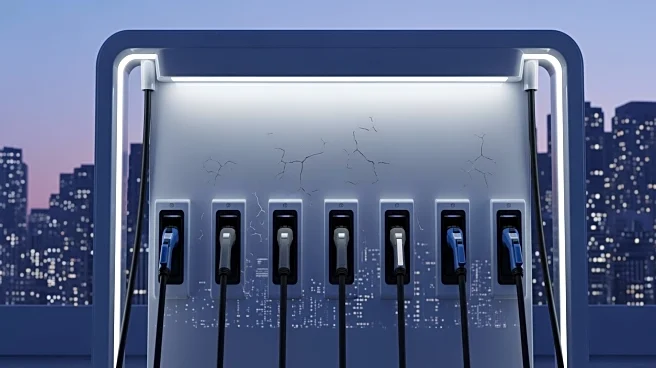What's Happening?
Consumer Reports conducted a survey to assess the reliability of public electric vehicle (EV) charging networks across the United States. The survey evaluated several networks, including Shell Recharge,
EVgo, Blink, Tesla Supercharger, and Rivian Adventure Network. Findings revealed that the Tesla Supercharger and Rivian Adventure Network received the fewest complaints, while Shell Recharge had the most. The survey highlighted common issues faced by EV owners at public charging stations, such as payment problems, charging power issues, and hardware malfunctions. According to the Department of Energy, there are over 78,000 public charging stations nationwide, with more than 168,000 individual charging ports. Despite the availability, EV owners reported experiencing issues at one in every five stations, with DC Fast Chargers being the most problematic.
Why It's Important?
The reliability of public EV charging networks is crucial for the widespread adoption of electric vehicles in the U.S. As more consumers transition to EVs, the demand for efficient and dependable charging infrastructure grows. The survey results underscore the need for improvements in charging station technology and customer service to enhance user experience. Networks with frequent complaints may deter potential EV buyers, impacting the growth of the EV market. Reliable charging solutions are essential for reducing range anxiety and ensuring that EVs can be a practical alternative to traditional vehicles. Addressing these issues can support environmental goals by encouraging more consumers to switch to cleaner transportation options.
What's Next?
Charging network operators may need to invest in upgrading their infrastructure and addressing the specific issues identified in the survey, such as payment systems and hardware reliability. As the EV market expands, competition among charging networks could drive improvements in service quality. Policymakers might consider incentivizing upgrades to charging stations to support the transition to electric vehicles. Additionally, consumer advocacy groups could push for more transparency and accountability from charging network providers to ensure better service for EV owners.
Beyond the Headlines
The survey results may prompt discussions about the standardization of charging technology and protocols across different networks to minimize compatibility issues. There could be ethical considerations regarding the accessibility of charging stations, especially in underserved areas. Long-term, the development of more reliable charging infrastructure could influence urban planning and the design of future transportation systems, integrating EV charging into everyday life seamlessly.










